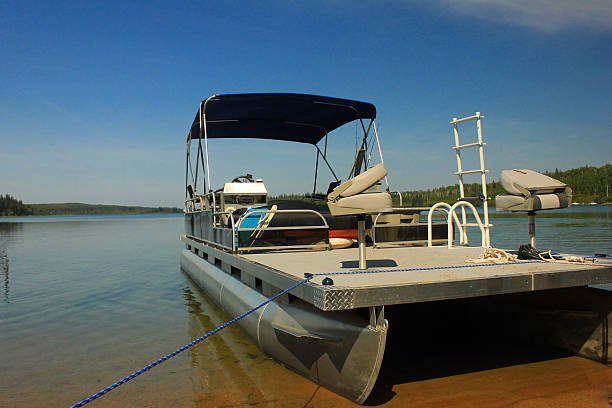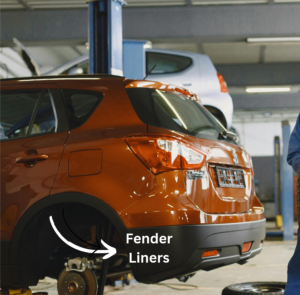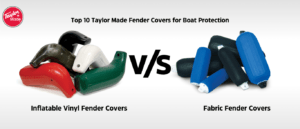“How to choose boat fenders” is a question that many boaters overlook, assuming that any fender will work as long as it creates a buffer.
Every boat is different, in factors like size, shape, and the environment you’re boating play a huge role in determining which fenders will offer the best protection, so How to choose boat fenders is very crucial.

This guide will help you understand how to choose boat fenders, from size to type, so that you can confidently protect your boat, whether it’s docked at the marina or anchored in choppy waters.
2. What Are Boat Fenders?
Boat fenders are essential pieces of gear designed to protect your boat from damage during docking or when tied up next to another vessel.
Fenders act like cushions, absorbing impact and preventing your boat’s hull from scraping against docks, pilings, or other boats.
When learning how to choose boat fenders for your boat, it’s crucial to consider your specific needs, like your boat’s size, docking conditions, and the type of water you frequently navigate.

3. Why Choosing the Right Fender Size Matters
A common belief among boaters is that fender size doesn’t really matter. Many assume that as long as you have fenders in place, they’ll do the job. But here’s the truth: choosing the right fender size is absolutely crucial.
Fenders that are too small might not provide enough protection, while oversized fenders can be cumbersome and awkward to handle, especially on small boats.
The size of your boat, how you dock, and the type of water you’re navigating should all influence your fender choice.
For example, a small boat in calm waters can get by with smaller fenders, but a large yacht docking in rough water needs larger, more heavy-duty fenders to stay protected.

How to Measure Boat Fenders

When figuring out what size boat fenders you need, a simple rule of thumb is to use one inch of fender diameter for every 4 to 5 feet of boat length. This provides a good balance between protection and practicality.
If you own a larger boat or frequently dock in rough conditions, you might want to go up in size for extra safety.
For example:
- A 20-foot boat should ideally use fenders that are about 4 to 5 inches in diameter.
- A 40-foot yacht would need fenders that are around 8 to 10 inches in diameter.
It’s important to remember that the number of fenders matters too. Typically, you should have at least one fender per 10 feet of boat length.
So, if you’ve got a 30-foot boat, you’ll want three fenders at a minimum. This way, no part of your boat’s hull is left vulnerable when docking.
4. Types of Boat Fenders
Another misconception is that all boat fenders are the same, and you can just pick which ever one you find first. In reality, there are various types of boat fenders, and choosing the wrong type can leave your boat exposed to unnecessary risks.
Different fenders are designed for different purposes, and it’s important to choose the right one based on your boat type, docking conditions, and water environment.
1. Cylindrical Fenders

Cylindrical fenders, also known as sausage fenders, are the most common type. These fenders are versatile and can be hung either vertically or horizontally, making them ideal for general use.
They’re perfect for smaller boats or those that dock in calm marinas. You’ll often see them used on boats of all sizes due to their simplicity and effectiveness.
2. Round Fenders

Round fenders, also called ball fenders, are typically used by larger boats like yachts or vessels that need extra protection. They’re bulkier and provide better shock absorption in rough waters or busy marinas.
If you often dock in choppy conditions or expect a lot of movement while your boat is moored, round fenders are a better option.
3. Specialty Fenders

Specialty fenders are designed for specific needs, such as docking in tight spots or protecting irregular-shaped boats. For example, some specialty fenders are shaped to fit snugly on narrow docks or are built to protect against specific impacts, like from pylons or larger vessels.
These are ideal for boaters who face unique docking challenges and need more than a standard fender setup.
5. Inflatable vs. Solid Fenders
Another important choice is whether to go with inflatable vs. solid boat fenders. Inflatable fenders are lightweight and easy to store, making them a favorite for boaters who need flexibility.
They can be quickly inflated when needed and deflated for compact storage. On the other hand, solid fenders are more durable and ready to go at any time, though they take up more space.
For example:
- Inflatable boat fenders
Are great for small boats where storage is limited. - Solid fenders
offer more durability and are better for boats that spend a lot of time in rough or busy docking areas.
By understanding the types of boat fenders available and how to choose the right size, you’re setting yourself up for a safer and more protected boating experience.
Picking the wrong fenders can leave your boat at risk, so it’s important to select carefully based on your boat’s unique needs.
6. How to Choose the Right Fender Based on Your Boat Type
Different boats have different needs, and knowing how to choose boat fenders based on your boat type is crucial to ensuring maximum protection.
Fenders for Smaller Boats (Fishing Boats, Kayaks, etc.)
If you own a smaller boat, like a fishing boat or a kayak, you don’t need massive fenders. Smaller, cylindrical boat fenders work perfectly for these vessels.
They’re lightweight, easy to maneuver, and offer plenty of protection in calm docking conditions.
For example:
- A small fishing boat may only need two or three small fenders, placed strategically along the side.
- If you have a kayak or canoe, specialized, compact fenders will prevent scraping when you pull up to the dock.
Fenders for Pontoon Boats
Pontoon boats are unique because they have flat, vertical sides, which require fenders designed specifically for pontoons. Look for flat or rectangular fenders that hug the side of the boat tightly.
These types of fenders offer superior protection compared to standard round or cylindrical options. Because pontoons are often docked in marinas with multiple boats, it’s especially important to use fenders that provide enough cushion to prevent damage.

Fenders for Yachts or Large Boats
For yachts or large vessels, you’ll want heavy-duty boat fenders that can handle rough waters and heavy impacts. Larger, round fenders (sometimes called ball fenders) are the go-to choice for yacht owners,
as they provide significant cushioning between your boat and the dock or neighboring vessels.
These fenders are also useful for boats frequently docked in crowded marinas or rough conditions. In this case:
- Yachts typically require larger fenders, and you’ll likely need more than just a few. Depending on the size of your yacht, six or more fenders might be necessary to fully protect the hull.
When selecting fenders for large boats, focus on durability. Opt for solid boat fenders that can withstand more wear and tear, especially if your boat spends a lot of time in busy marinas or challenging environments.
7. Fender Placement: How Many Fenders Do You Need?
A common mistake is thinking you can get away with just a couple of fenders, regardless of your boat size. While two or three fenders might suffice for smaller boats, larger vessels need more comprehensive protection.
To properly safeguard your boat, you need to know not just how to choose the right boat fenders, but also how many and where to place them.
How Many Fenders Should a Boat Have?
The general rule of thumb is to use at least one fender for every 10 feet of boat length. For instance:
- A 20-foot boat should have two fenders.
- A 40-foot boat should have at least four fenders.
However, if you’re docking in a tight or high-traffic area, it’s a good idea to use more than the minimum to ensure your boat is fully protected.
Fender Placement
Where you place your fenders can be just as important as the number you use. To maximize protection:
- Side Docking:
Place the fenders along the side of your boat that will be in contact with the dock. If you’re unsure which side will be docked, be prepared to position fenders on both sides. - Bow and Stern Protection:
For larger boats, make sure to position fenders at the bow and stern as well. This ensures full protection, especially if you’re docking in a marina where your boat is close to other vessels.
Adjusting Fenders for Different Conditions
Not all docking scenarios are the same, and sometimes, you’ll need to adjust your fenders based on the water conditions.
For example:
- Calm Waters:
In calm waters, you might only need a few well-placed fenders, as there’s less risk of your boat moving against the dock. - Rough Waters:
If you’re docking in rough waters, you’ll want to place fenders all along the length of your boat. Use larger or more heavy-duty fenders to absorb the additional impact caused by waves or choppy conditions.
By understanding proper boat fender placement, you’ll prevent unnecessary damage to your boat.
8. Maintaining Your Boat Fenders
A common misconception about boat fenders is that they don’t require much care or attention. Many boat owners think that as long as the fenders are doing their job, they can just leave them be.
But in reality, proper maintenance is essential for ensuring your fenders last as long as possible and continue to protect your boat effectively.
1. Regular Cleaning
Cleaning your fenders regularly is crucial. Dirt, grime, and marine growth can accumulate on fenders over time, reducing their effectiveness and lifespan.
A simple wash with mild soap and water can do wonders.
Here’s how:
- Use a soft brush or sponge to scrub away any buildup.
- Rinse thoroughly with fresh water to remove any soap residue.
Cleaning not only helps your fenders last longer but also keeps them looking great! Nobody wants to pull up to a marina with dirty, grimy fenders hanging over the side.
2. Inspect for Damage
Every time you clean your fenders, take a moment to inspect them for any signs of wear or damage. Look for:
- Cracks or tears in the material.
- Signs of excessive wear on the edges or surfaces.
If you notice any damage, it’s best to replace the fender before it fails during a docking situation. Remember, prevention is key!
3. Proper Storage
When you’re not using your boat, store your fenders properly. Leaving them out in the sun or harsh weather can degrade the material over time. If possible:
- Stow fenders in a cool, dry place when not in use.
- Avoid placing heavy objects on top of them, which can cause deformation.
Proper storage extends the life of your fenders and ensures they’re ready to go whenever you hit the water.
9. Common Mistakes to Avoid When Choosing Boat Fenders
Now that you understand the importance of maintenance, let’s tackle another common issue: mistakes boaters make when choosing fenders. Many folks overlook critical factors, leading to problems down the line. Here’s how to avoid those pitfalls.
1. Ignoring Size Requirements
One of the most frequent mistakes is ignoring the size requirements for fenders.
Always follow the one-inch diameter for every 4 to 5 feet of boat length rule.
Don’t think that a smaller fender will suffice just because your boat is on the shorter side; you want to ensure full protection.
2. Overlooking the Environment
Another common blunder is not considering where you’ll be using your fenders. The environment plays a huge role in fender selection.
For example, if you’re primarily boating in rough waters or tight marinas, you’ll want more substantial, durable fenders that can handle increased impact.
Don’t just grab the first fenders you see consider the conditions where you’ll be docking or anchoring.
3. Skipping on Quality
While it might be tempting to go for cheaper options, skimping on quality can lead to headaches later on. Low-quality fenders may wear out faster or fail when you need them most.
Invest in durable, high-quality fenders to ensure they withstand the elements and protect your boat properly.
4. Not Accounting for Quantity
Some boaters also make the mistake of not purchasing enough fenders. If you own a larger boat or frequently dock in crowded areas, be prepared with more than just a couple. Having multiple fenders gives you more flexibility and better protection.
5. Forgetting About Fender Lines
Lastly, don’t overlook the importance of fender lines. Some boaters think the fender itself is enough, but if you don’t have strong lines to secure them properly, they won’t do their job effectively.
Make sure your fender lines are sturdy and long enough to adjust the fenders according to the docking conditions.
By maintaining your boat fenders and avoiding these common mistakes, you’ll enhance the longevity of your gear and ensure your boat stays protected.
10. Where to Buy Boat Fenders
A common belief is that buying boat fenders is as simple as strolling into any store or hopping online and making a quick purchase.
While it sounds easy, choosing the right place to buy your fenders can significantly affect your options, quality, and even price. So let’s dive into the best places to shop for boat fenders.
Local Marine Supply Stores
Starting with your local marine supply store is often a great idea. These shops usually have knowledgeable staff who can help you select the right fenders based on your boat type and needs.
Plus, you can physically inspect the fenders for quality and size, ensuring you’re making an informed decision.
. Boat Shows and Expos
Attending boat shows and expos can be an exciting way to shop for boat fenders. These events often feature a wide range of marine products, including fenders.
You’ll have the chance to talk directly to manufacturers and vendors, ask questions, and sometimes snag great deals.
Buying at these events also allows you to
- See the latest innovations in boat fender technology.
- Network with other boaters who can share their experiences and recommendations.
Specialty Online Stores
There are many online stores that focus solely on marine supplies, like Defender or Fisheries Supply. These specialty retailers often have a more extensive selection of fenders than general retailers.
They may also provide detailed descriptions, videos, and user reviews to help you choose the right fender for your boat.
Second-Hand Marketplaces
Don’t overlook second-hand marketplaces like eBay or Facebook Marketplace. While you should always be cautious when buying used items, you can find quality fenders at a fraction of the new price.
Just be sure to check for any signs of damage or wear before making a purchase.
10. Conclusion: The Importance of Choosing the Right Boat Fenders
At the end of the day, it’s easy to underestimate the importance of choosing the right boat fenders. Many boat owners might think, “Fenders are just cushions; they’ll do their job regardless.”
However, the truth is that the right fenders can make a world of difference in protecting your investment.
Choosing the appropriate fenders involves understanding your boat type, considering the docking conditions, and maintaining your fenders for longevity.
Whether you decide to shop locally or online, ensure you know what you need and don’t rush into buying the first fenders you see.
For more detail of boat fenders click here.
Remember, effective fender usage can save you from costly repairs and give you peace of mind while you enjoy your time on the water.
With a little research and the right choices, you can protect your boat and enhance your boating experience.
In summary, understanding how to choose boat fenders is essential for all boat owners.



